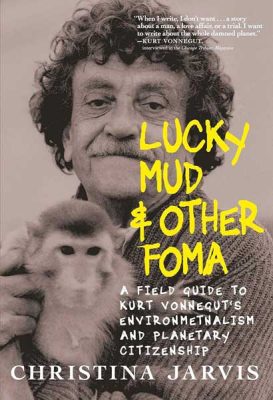A Look at Kurt Vonnegut, Champion of Our Beloved Planet
Review An assessment or critique of a service, product, or creative endeavor such as art, literature or a performance.
By Michael Malone
A Novel Concept looks at a non-fiction book this week, but one about a colossal figure in American fiction.
 “Lucky Mud & Other Foma” bears the subtitle “A Field Guide to Kurt Vonnegut’s Environmentalism and Planetary Citizenship,” and looks at how Vonnegut’s concerns about the planet, and those who inhabit it, made their way into his novels, and some of his other work.
“Lucky Mud & Other Foma” bears the subtitle “A Field Guide to Kurt Vonnegut’s Environmentalism and Planetary Citizenship,” and looks at how Vonnegut’s concerns about the planet, and those who inhabit it, made their way into his novels, and some of his other work.
“Vonnegut saw writing itself as an act of good citizenship, as a way of ‘poisoning’ the minds of young people ‘with humanity…to encourage them to make a better world,’” the author, Christina Jarvis, says in the introduction.
Jarvis is a professor of English at SUNY Fredonia.
First off, let me explain the book’s funky title. Lucky mud and foma are Vonnegut creations, aspects of a religion he made up in “Cat’s Cradle” that is called Bokononism. Lucky mud is the mud tapped by God himself to sit up and take in the Earth around it, while foma is a harmless untruth.
Vonnegut also authored a book not many people talk about called “Wampeters, Foma & Granfalloons.”
Besides “Cat’s Cradle,” Jarvis looks at Vonnegut’s environmental themes in “Player Piano,” “Deadeye Dick,” “Breakfast of Champions” and “Galapagos,” among other novels. She also looks at how the themes played into his non-fiction, including magazine articles and speeches at colleges, including SUNY Albany, and rallies.
Jarvis examines Vonnegut’s boyhood in Indianapolis, when he would take camping and hiking trips out west with a school club, which spawned his love of the outdoors. He wrote about one journey in a 38-page manuscript he entitled “The Rover Boys in the American Southwest,” which Jarvis describes as a “rambling, episodic narrative.”
Like “Breakfast of Champions,” “The Rover Boys” features the author’s rough illustrations alongside his prose.
“The travelogue captures Kurt’s early planetary citizenship through the sights, ethics and habits he chose as he shaped his own adventures,” Jarvis writes.
Before there was “Cat’s Cradle,” there was the Vonnegut short story “Ice-Nine,” about a compound that freezes any water it comes in contact with. Vonnegut later turns that compound into an atomic bomb in that 1963 novel.
“In its final form “Cat’s Cradle” offers a minimally described ice-nine-induced landscape in chapter 119, noting tornadoes, uniform blue-white solidity, an angry sun, and air that was ‘hot and dry and deathly still,’” Jarvis writes.
Jarvis examines a creek polluted by industrial waste in “Breakfast of Champions,” humankind rendered infertile after a plague in “Galapagos,” and a plague called the Green Death in “Slapstick,” where the sky turns yellow “by the propellants for underarm deodorants.”
In “Plague on Wheels,” a novel within “Breakfast of Champions” by Vonnegut’s fictional author Kilgore Trout, Jarvis notes “the poisoned marshes and meadows of New Jersey,” and a truck driver who realizes “his truck was turning the atmosphere into poison gas, and that the planet was being turned into pavement so his truck could go anywhere.”
Jarvis also details Vonnegut in his various residences, including Cape Cod and New York City, and how each unique setting shaped his view of the environment and our treatment of it.
“Lucky Mud & Other Foma” is not for everyone. Quirky and offbeat, Vonnegut himself is not for everyone, though his fans will enjoy a book that explains where many of the ideas fueling his novels came from, and a unique peek at the author and what he was like. Vonnegut, who died in Manhattan in 2007, comes off as likable and mostly upbeat, but increasingly cranky about the fate of our planet, and those who are not acting with its best interests in mind.
I found “Lucky Mud,” released last year, readable and mostly enjoyable. Author Jarvis knows the subject of Vonnegut intimately. The book goes for 265 pages, with lots and lots of notes and bibliography and index stuff thereafter. GoodReads rates “Lucky Mud” at 4.19 out of 5, with a mere 21 people rating the book. (Like I said, “Lucky Mud” is not for everyone.)
We live in an era where many, many authors, and virtually every actor, film director and Instagram influencer, is a champion of our planet. But way before the issue was fashionable, there was Vonnegut, telling America, in ways both subtle and noisy, to leave only footprints behind.
A couple months after the Three Mile Island disaster of 1979, Vonnegut spoke at an anti-nuclear rally in Washington. He touched on points he makes in “Deadeye Dick,” notes Jarvis, including his “embarrassment” over the way “Americans have guided our destinies so clumsily.”
He urged Americans to tune out the government spokespeople talking up nuclear power and take action for the good of Planet Earth.
Failure to do so, Vonnegut said, might result in killing “everything on this lovely blue-green planet.”
Freelance journalist Michael Malone lives in Hawthorne with his wife and two children.

Examiner Media – Keeping you informed with professionally-reported local news, features, and sports coverage.
